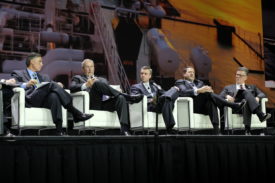Alan
This week, I finished Doris Kearns Goodwin’s classic book about World War II and Franklin and Eleanor Roosevelt. Shorter: They did not have a healthy marriage, but their political partnership was unprecedented in its impacts. World War II did more for equality of opportunity for women and African Americans, and for civil rights, than you knew. World War II changed the landscape of the United States almost as much as it did the battlefields of Europe and Asia. (This week, by coincidence, DKG also published a new book on Teddy Roosevelt.)
Some Swedish movie theaters are rating films according to a simple test: “When you watch a movie, ask yourself: Does this film contain two or more female characters…who have names…and have a conversation with one another…about something other than a man?” Shockingly many feature films fail the test.
I vote a best-Sightline-blog-title-in-months award to: “Intrauterine Bling.”
Also: new Pomplamoose!
Anna
How to write the worst possible column about Millennials.
Is the American “center” a corporate fantasy (cooked up by insider politicos)?
Bernie Sanders on the shameful gap between the very rich and everyone else. Can we clone this guy, please?
Poverty is way more “mainstream” than you might think. But there is good reason to talk about its prevalence across the population periods. As Mark Rank, professor of social welfare at Washington University and a co-author of the forthcoming book, “Chasing the American Dream: Understanding What Shapes our Fortunes,” sums it up:
The solutions to poverty are to be found in what is important for the health of any family—having a job that pays a decent wage, having the support of good health and child care and having access to a first-rate education. Yet these policies will become a reality only when we begin to truly understand that poverty is an issue of us, rather than an issue of them.
It’s the investments we make in people and communities—not just the safety net but the ladders of opportunity we build together—that matter.
Nicole
Finally! An invisible bike helmet. No, it’s not an article in the Onion; it’s a cool reimagining of biking protection by the Swedish company Hovding, and it could even match your outfit. It’s pricey, but inspiring to see this kind of innovation.
Eric
Here’s a brilliant new video on Northwest coal exports.
David Ball won a well-deserved Webster (British Columbia’s top journalism award) for his five-part series, Cross-Border Coal War at The Tyee. Go read it, if you haven’t already.
Upon my return from time off, I was aghast to see a gaping hole in last week’s “weekend reading” entry. Not one of my otherwise sharp-eyed Cascadian colleagues called attention to the passing of the Oregon engineer behind the exploding whale. By my lights, the events of November 12, 1970 are among the most memorable in Northwest history. It was filmed live by a local TV crew, it’s on YouTube now, and watching it will be the best 4 minutes of your day.
Charles Mudede reports on the defeat of Washington’s Initiative 522 and the most bizarre political event he has ever seen.
I found this video interview with famously reticent Seahawks running back Marshawn Lynch surprisingly affecting. Football fans should watch it. And non-football fans in Cascadia should seize this season’s opportunity to start watching the Seahawks. They’ve got talent all over the place and Lynch is truly a marvel. He’s probably best known for his ability to break tackles—and to drag multiple much-larger defenders along with him, seemingly in defiance of physics—but I’d argue it’s his extraordinary sense of balance that’s most astonishing. (This now ends the longest account of football ever published by Sightline Institute.)
Clark
A chart depicting the collapse of the American Middle Class.
As it turns out, the Lone Ranger—the real-life inspiration for the story—was African American.
Crack-smoking mayor Rob Ford is getting a bit of attention these days…so it’s a good time to remind people that Mayor Ford was one of the main propagators of the wacky “war on cars” meme.
Just because maps are cool.









Sophia Katt
The “Swedish film test” is actually the Alison Bechdel test, which the Swedes co-opted, with attribution, for their project:
http://en.wikipedia.org/wiki/Bechdel_test
If Alan didn’t already know…
Alan Durning
Yep. I knew. Just being brief. Thanks for commenting.
Rex Bruce Burkholder
Just can’t resist: re: invisible bike helmet. more marketing than substance. helmets of whatever kind are tertiary injury prevention at best, even if “invisible.” Most cyclist fatalities are caused by being hit by cars going over 45mph, at which speeds only 10% survive, helmet or no helmet.
Can’t wait for their next product: invisible airbags for pedestrians that blow up like the Michelin Man on impact.
norse
Good point on the helmets: here’s a study pointing out the confounders involved in public decision making with respect to helmet laws.
http://www.bmj.com/content/346/bmj.f3817?ijkey=I5vHBog6FhaaLzX&keytype=ref